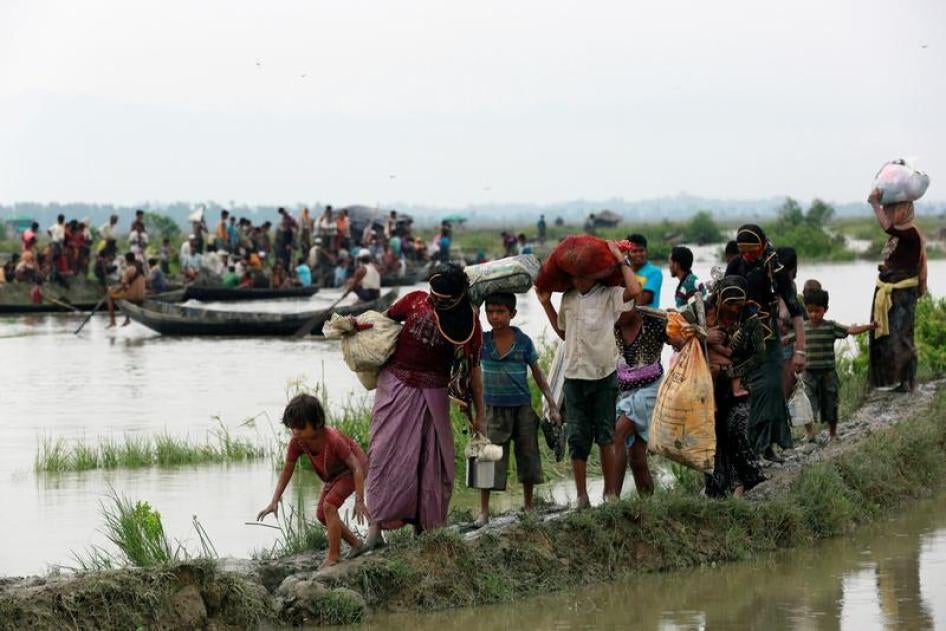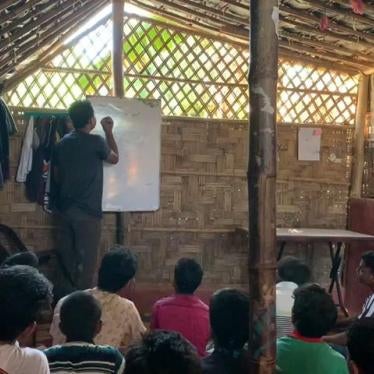The world seems to be sitting on its hands as the Rohingya crisis in Myanmar descends into what the United Nations High Commissioner for Human Rights has described as "a textbook example of ethnic cleansing".
In just three weeks, more than 380,000 ethnic Rohingya have fled to Bangladesh.
On August 25, an armed Rohingya group attacked a string of police posts and a military base in northern Rakhine State, killing a dozen security officers. In response, Burmese security forces unleashed a devastating campaign of killing, forced expulsions and burning of entire villages.
Momena, 32, described her flight from the village of Kirgari Para on August 26 when soldiers approached.
"I fled with the other villagers and we sheltered in the jungle overnight. When I returned to the village the next morning, after the soldiers had left, I saw about 40 to 50 villagers dead, including some children and some elderly," she said.
"All had knife wounds or bullet wounds — some had both."
Momena made it safely to Bangladesh with two of her children, but said she had to leave her husband and 10-year-old son behind. She has had no news of them since.
Rohingya in Myanmar have faced decades of discrimination and persecution, at times evolving into full-scale violence.
It is unsurprising that some among the million or so Rohingya have taken to violence against the Myanmar government. The Myanmar authorities see the Rohingya as unwelcome Muslim immigrants from Bangladesh, denying them access to citizenship and equality before the law even though most Rohingya families have lived in Myanmar for generations.
This is not the first time Rohingya have fled for their lives from Burmese security forces — Human Rights Watch found crimes against humanity and ethnic cleansing during anti-Rohingya attacks in 2012. The issue is how to stop the abuses, prevent their recurrence, and assure that the displaced people can safely return.
Why should Australia care? After all, there are crises aplenty around the world. Why is this one more significant and worthy of our attention?
Firstly, Myanmar is a member of the Association of Southeast Asian Nations, or ASEAN. ASEAN could play a valuable role in speaking out on the human rights crisis in Myanmar, but the crisis could also increase tensions between predominantly Muslim countries like Indonesia, Malaysia and mostly Buddhist Myanmar.
ASEAN played an important role as an interface between Myanmar and the international community during the humanitarian response to Cyclone Nargis, which destroyed much of the Irrawaddy Delta in 2008.
ASEAN countries have a stake in this outcome because whenever Rohingyas must flee violence, they invariably end up on the beaches of Thailand, Malaysia, Indonesia, and occasionally Australia. Australia can help ASEAN overcome a lack of resolve and unanimity to act quickly and decisively.
Secondly, several hundred thousand new Rohingya arrivals in Bangladesh have joined a population of at least 400,000 Rohingya who live in squalid camps in Cox's Bazaar, along the border.
If they can't return home safely and they can't remain in Bangladesh, then many may take to boats, generating a fresh wave of people seeking asylum across the region, including in Australia.
Then there is the growing concern about the spread of Islamist extremism in south-east Asia. A protracted humanitarian crisis in Bangladesh has the potential to be a fertile recruiting ground for militants, and this is not in the interest of Myanmar, Bangladesh, ASEAN or Australia.
Also, Australia is seeking a seat on the UN Human Rights Council. One way to burnish its credentials is to show human rights leadership on a crisis that has the potential to destabilise the region.
Australia has modestly but effectively led regional coalitions to resolve emergent crises in the past.
For instance, in 1993, then foreign minister Gareth Evans was a driving force in generating the momentum for a UN-mandated international mission to bring about a peaceful and democratic Cambodia.
Similarly, in 1999, when violence broke out after the East Timor referendum results showed clear support for independence, Australia took a principled stand and led a coalition to restore peace and order, drawing in support of key ASEAN partners such as Thailand, the Philippines, Malaysia and Singapore.
As Bangladesh struggles to cope with the newly-arrived Rohingya refugees, and Myanmar unhelpfully blocks international humanitarian agencies from resuming their work in Rakhine State, Australia should also lead in providing urgently needed humanitarian assistance.
Today, the Australian government has a more robust capability to provide humanitarian assistance and disaster relief than ever before.
With the navy's new amphibious ships, and experience in effective multi-agency cooperation displayed in responding to a string of disasters in recent years, Australia is best placed to offer to form the foundation of a multinational and multiagency coalition to respond to this massive humanitarian crisis.
The time to act is now. Australia has long been a middle power acting like a small power but it can accomplish a great deal when it rises to the occasion. Australia should engage with its neighbours to find a solution to this crisis that, if left untended, could spiral further into chaos.
Australia needs first to call for Myanmar to allow humanitarian agencies and independent monitors into Rakhine State.
It should be a leader in the effort to support the Bangladeshi authorities in responding to the overwhelming needs within Bangladesh.
These are the starting points for a wider coalition in which Australia should play a leading role.
John Blaxland is professor of international security and intelligence studies, director of the ANU Southeast Asia Institute, and Head of the Strategic and Defence Studies Centre at the ANU. Elaine Pearson is the Australia director of Human Rights Watch.









